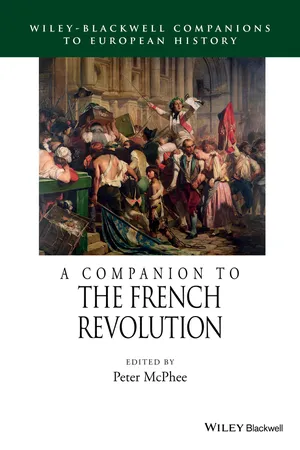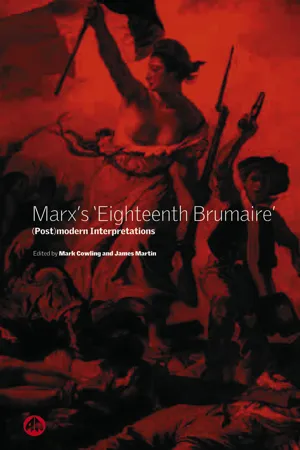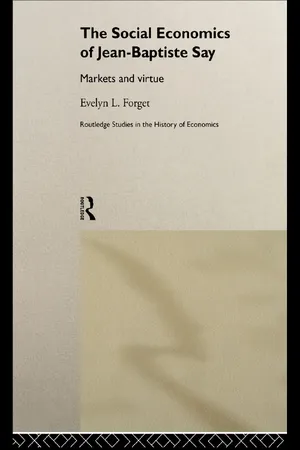History
Coup of Brumaire
The Coup of Brumaire refers to the seizure of power in France by Napoleon Bonaparte on November 9-10, 1799. This event marked the end of the French Revolution and the establishment of the Consulate, with Napoleon as First Consul. The coup consolidated Napoleon's authority and paved the way for his eventual rise to Emperor of the French.
Written by Perlego with AI-assistance
Related key terms
4 Key excerpts on "Coup of Brumaire"
- On his return to France in October 1799, Napoleon found the Directory in terminal discord, lacking clear leadership, fearful of a Jacobin resurgence, the director Sieyès scheming for a change of regime and a new constitution drawn in his — Sieyès' — own image, and the gains of the Italian campaign all but squandered. A coup would need a strong military man, and Napoleon's fortuitous return to and appointment as commander of Paris quickly settled that question. By another lucky chance, his brother Lucien was then president of the council of five hundred, the lower house of the legislature, to which he had been elected the previous year. The plot began when Sieyès and Ducos resigned as directors, soon afterwards persuading the reluctant Barras to do the same, which had the intended effect of incapacitating the chief executive. A majority of the council of ancients, the upper house, supported this move, and on 18 Brumaire (9 November) it voted to move the government to Saint-Cloud. This, it was hoped, would pre-empt any violent intervention by the people of Paris.Next day, when the council of five hundred proved unwilling at first to go along with the plan, Napoleon faced their raucous hostility in person. During the uproar — the precise details remain unclear — he appears either to have fainted or to have been knocked to the ground unconscious. It was then that Lucien saved the situation. His dramatic declarations on behalf of his brother's good faith and respect for the Republic persuaded both councils to disperse. An undertaking was given that each council would choose twenty-five of its own members to form a commission which would then draw up a new constitution. The immediate upshot was that Napoleon, Sieyès, and Ducos were named as provisional consuls. In the event, the citizens of Paris received the news of the coup without a furore, and the die was cast. Napoleon was the great beneficiary, but Lucien the true hero, of Brumaire.
The Fortunes of the Clan
This chapter began with the young Napoleon striving for attention and acclaim among his family in a remote Corsican home. It now ends with him in full manhood, his fundamental character formed, and his professional career poised on the threshold of real political as well as military power at the heart of France. If he was more than a little indebted to one of his brothers for the success of his coup, it must be said that Lucien's decisive intervention had been possible only because of his official position in the council of five hundred. That in turn had come about very largely in recognition of Napoleon's rising fame under the Directory and his determination to use it in the interests of all his family. Frédéric Masson made this the binding theme of his multi-volume study of Napoleon's relations with his family, the most ambitious ever attempted, nearly a century ago. Since the instincts of clan had evidently worked to good advantage in the Brumaire coup, it would be appropriate to complete the picture by looking briefly at how the other Bonapartes had fared during the years leading up to that watershed. - eBook - ePub
- Peter McPhee(Author)
- 2012(Publication Date)
- Wiley-Blackwell(Publisher)
coup d’état of 18–19 Brumaire VIII (November 1799) did so for practical, not ideological, reasons. Nonetheless, the main architect of the coup, Emmanuel Sieyès, had a political philosophy to justify the anti-democratic outcome. He thought that as long as the power of the state was limited by legal protections for individual rights, the political elite could be chosen with little involvement of the people. In other words, the core of modern liberalism – legal protections that give individuals the freedom to pursue their own ends – could be best assured through authoritarian rule – Thomas Hobbes’ notion of a sovereign ruling by law. The Constitution of Year VIII adopted in late 1799 instantiated this liberal authoritarianism in the new institutions of the Consulate (Jainchill 2008). However, subsequent events proved the danger of basing a political system on Sieyès’ ideas. By the summer of 1802, Bonaparte had exploited various opportunities to turn the regime into a personal dictatorship, the legitimacy of which depended heavily on the new security state.The Brumaire coup brought Bonaparte to power, but it should not be treated as historical shorthand for the transition from democracy to dictatorship in France. The process took years to complete, extending from the coup of 18 Fructidor V (September 1797) to the Life Consulate (August 1802), which is when the Revolution truly ended (Brown 2006). Moreover, the transition interacted directly with the construction of a new security state. The term “security state” draws attention to the predominant source of legitimacy for the administrative and judicial structures of the Consulate that replaced the dubious democracy of the late Directory, namely, the ability to restore and maintain law and order. Napoleon Bonaparte was a military hero and political genius, but these personal traits have largely obscured the fact that the authoritarian regime constructed under his leadership was the product of a general consensus among active citizens. Such people had not withdrawn their support from the Directory because it was insufficiently democratic; they came to despise the regime because it failed to end factional politics, repair the economy, and restore public order. The Brumairians agreed with Bonaparte in combining a stronger executive with less partisan appointments. Depoliticization depended on a greater concentration of authority both in the person of the ruler and in the apparatus of rule.The basic lineaments of the security state were in place by 1802. Bonaparte played a role in this, of course, but the nature of the new apparatus of rule was determined mainly by the social and political circumstances of ending the French Revolution. The creation of the new security state depended on several key developments: the emergence of a modern bureaucracy; choosing foreign war over domestic programs; using the army for both policing and justice; and incorporating exceptionalism into the new regime. - eBook - ePub
Marx's 'Eighteenth Brumaire'
(Post)Modern Interpretations
- Mark Cowling, James Martin(Authors)
- 2002(Publication Date)
- Pluto Press(Publisher)
8Of course, Marx was not unaware of the importance of the presidential election, and he explains his brief treatment of it in the Eighteenth Brumaire by noting that he has already dealt with its significance elsewhere.9 However, the passage in The Class Struggles in France to which he is referring is itself little more than a sketchy outline.10For Marx, ‘10 December 1848 was the coup d’état of the peasants’,11 a point he reiterates in the Eighteenth Brumaire,12 refining it in the conclusion to observe that ‘the Bonaparte dynasty does not represent the revolutionary peasants, but rather the conservative ones’.13 He explains, very briefly, how ‘the other classes helped to complete the election victory of the peasants’,14 through a mixture of protest vote and manipulation for their own ends. However, there are a number of problems with this interpretation. First, whilst Louis-Napoleon undoubtedly did attract a great deal of support from the rural population, his votes in fact came from all kinds of social and geographical groups; his success in urban areas (he obtained well over half the votes in five of the eight largest cities in France, including Paris) was such that ‘coup d’état of the peasants’ is not an adequate explanation for the scale of his victory. Second, Marx rightly saw conservatives and monarchists as seeking to use Louis-Napoleon’s candidature for their own ends, and their backing was a considerable boost to him in the last weeks of the campaign. However, they only turned to him after failing to put forward a candidate of their own because he was already attracting enough popular support to look like a possible winner. As de Tocqueville observed in his memoirs, ‘As public opinion increasingly favours Louis-Napoleon, he carries the parliamentary leaders with him; … most of them in the end let themselves be swept along in the maelstrom; it is emphatically society’s tail which wags its head.’15 Their backing, then, was a consequence of that popular support, the reasons for which need to be examined more fully. Finally, in placing emphasis more on reasons for voting against Cavaignac than for Louis-Napoleon, Marx underestimates the positive appeal which Bonapartism could exert in a society which has been shown to exhibit greater and more complex social differentiations than Marx’s broad class categorisation allows.16 - eBook - ePub
- Evelyn L. Forget(Author)
- 2002(Publication Date)
- Routledge(Publisher)
jeunesse dorée (gilded youth) fomented opposition to Terror, and battled in the streets with the sans-culottes. The gilded youth were the indulged children of the professional classes, who had avoided conscription through family ties. Tolerated by both extremes, they were responsible for the re-emergence of moderate royalists. The White Terror began when Jacobins in the west and the southeast of France were massacred by royalist supporters. A royalist attempt to seize power in the Convention was thwarted when the army, under Bonaparte, was called in to suppress it.The Constitution of 28 October 1795 limited suffrage to property owners, and established a system of government led by an executive Directory consisting of five members with control over the Council of Ancientsand the Council of Five Hundred. This lasted four years, during which Bonaparte’s military successes contrasted sharply with the disorder in Paris. The Directory was threatened by Jacobins in the Babeuf plot of April 1796, and in a coup d’état on 18 Fructidor (4 September 1797) royalist supporters were removed from the Directory. A further coup on 18 Brumaire (9 November 1799) abolished the Directory itself. Say was named a member of the Tribunate in December 1799, just as Bonaparte’s Consulate ushered in an era that would see the demise of the Tribunate.The 18 Brumaire coup was engineered by Bonaparte’s brother Lucien, who was president of the Council of Five Hundred, and the Abbé Sieyès. Lucien’s goal was to cement Bonaparte’s power, whereas Sieyès intended to reform the constitution. The fifty-member legislative commission that managed the transition that brought Bonaparte to power included Cabanis, J.-B. Say, Daunou and Chénier (Welch 1984:38). Lucien created so much distrust between the two councils that the Ancients passed a decree constituting Sieyès, Bonaparte and Pierre-Roger Ducos as a provisional government in the role of consuls. Bonaparte manoeuvred to replace Sieyès and Ducos with figurehead consuls Charles-François Lebrun and Jean-Jacques de Cambacérès, effectively giving himself sole executive power. Sieyès’s new constitution came into power on Christmas Day 1799, but it did not limit Bonaparte’s authority. Ironically, Bonaparte had just been granted more absolute power than Louis XVI had enjoyed before the revolution.It did not take long for future trends to become clear to Say. As long as he remained a Tribune, he dedicated himself to financial affairs and economic reform. Say continued to protest against Bonaparte’s usurpations, but actually made only a few contributions on relatively minor matters (Steiner 1991:189n). His past connections with Bonaparte apparently allowed him to escape the purge of 1802, but Say left the Tribunate in 1804 just after the publication of the first edition of the Traité d’Économie Politique.5
Learn about this page
Index pages curate the most relevant extracts from our library of academic textbooks. They’ve been created using an in-house natural language model (NLM), each adding context and meaning to key research topics.



